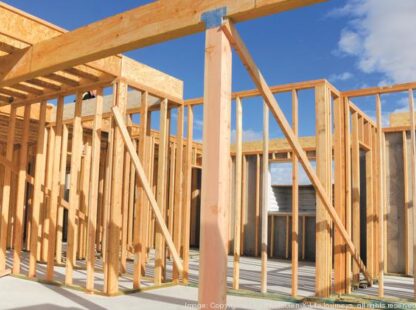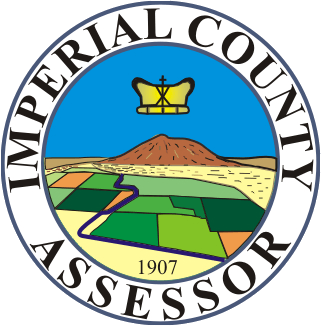Imperial County Assessor's Office
Real Property
The California Constitution requires that all property be taxed, unless otherwise exempted under the California Constitution or United States Constitution. Article XIII-A of the California Constitution requires that real property be reappraised only when such property undergoes a change in ownership or has new construction (per Proposition 13).
The assessment roll, and tax bills, show land values and improvement values. "Improvements" include buildings or anything of a structural nature (such as swimming pools, paving, etc.). When you have an "improvement" value, it doesn't usually mean that you have recently "improved" your property.

Proposition 13
The general tax levy for all agencies cannot exceed 1% of the property's assessed value, except for additional taxes for bonded indebtedness. In addition, agencies may levy direct assessment taxes to pay for services such as lighting maintenance, weed abatement, etc. The average tax rate is approximately 1.25%.
Real property is reappraised only when:
- A change in ownership occurs; or
- New construction is completed; or
- New construction is partially completed on the lien date (January 1); or
- A decline in value (see Proposition 8).*
*Except for these four instances, real property assessments cannot be increased by more than 2% annually, regardless of the rate of inflation.t.

Proposition 8
Proposition 8 allows the Assessor to review both the factored base-year value and the current market value of a property as of January 1 of each year and enroll the lesser value. When the current market value replaces the higher Proposition 13 value, the lower value is commonly referred to as a "Prop 8 Value". In no circumstance can the Assessor value a property higher than its Proposition 13 factored base-year value.
Although the annual increase for Proposition 13 values is limited to no more than 2%, the same restriction does not apply to values adjusted under Proposition 8. Actual market value must be enrolled as a Proposition 8 value and any subsequent increase or decrease in market value is enrolled regardless of its percentage change. However, when the current market value of a Proposition 8 property exceeds its factored Proposition 13 base-year value, the Assessor simply re-instates the factored Proposition 13 value.
Property owners who feel that their assessed value exceeds current market value should contact our office and request a Proposition 8 review. The last day to request a Proposition 8 review of the assessment on the current tax bill is October 30. Requests made after October 30 will apply to the upcoming tax year. Owners may also elect to file a formal assessment appeal during the open filing period.
Proposition 8, passed in November 1978, amended Proposition 13 to reflect declines in value. As a result, Revenue & Taxation Code Section 51 requires the Assessor to annually enroll either a property’s Proposition 13 base year value factored for inflation, or its Market Value as of January 1(taking into account any factors causing a decline in value), whichever is less.
Prop 8 reductions in value are TEMPORARY reductions which recognize the fact that the current market value of a property has fallen below its current (Prop 13) assessed value. Once a Prop 8 value has been enrolled, a property’s value must be reviewed each following January 1, to determine whether its then current market value is less than its Prop 13 factored value. When and if the market value of the Prop 8 property increases above its Prop 13 factored value, the Assessor will once again enroll its Prop 13 factored value. Prop 8 values can change from year to year as the market fluctuates up and down, but in no case may a value higher than a property’s Prop 13 factored value be enrolled.
For any given Roll Year, Prop 8 assessments may be adjusted by the Assessor no later than one year after the roll is published (normally July 1). Prop 8 assessments may also be appealed to the Assessment Appeals Board during the normal appeal periods (July 2 through November 30). Prop 8 assessment requests for reductions regarding the current roll which are denied after the normal assessment appeal period has expired cannot be appealed to the County Board of Equalization. Prop 8 assessments adjusted by the Assessor (not the County Board of Equalization) may be appealed no later than 60 days after the postmark date of the corrected tax bill or refund check.
Property owners who feel that their assessed value exceeds current market value should contact our office and request an Informal Review of their property. The Informal Review is only for the up-coming tax year, not the current year. The filing dates are December 1 through March 31. Please be aware that an Informal Review is not a Formal Appeal. To protect your rights to a Formal Appeal you must file that Appeal with the Clerk of the Board between July 2 and November 30 at (442) 265-1020. Filing this application for reduced assessment does not relieve the applicant from the obligation to pay the property taxes on or before the applicable due date shown on the tax bill.
If you need more information you can contact the Assessor's office by calling (442) 265-1300 or visit our office at 940 W. Main St., Suite 115, El Centro, CA 92243. Our office hours are 8:00 A.M. to 5:00 P.M. Monday through Friday.
Change In Ownership Reappraisals
When a transfer occurs, the Assessor receives a copy of the deed and determines if a re-appraisal is required under State law. If required, an appraisal is made to determine the new market value of the property as of the date of transfer. The actual sales price is a strong indicator of value, but it is not the only factor used in establishing the assessed market value. Sales of comparable properties are also indicators of value that the Assessor relies on.
The date of re-appraisal is generally the recording date of the deed that transfers ownership. However, the re-appraisal of property acquired by inheritance from an estate or living trust occurs as of the date of death of the former owner, not as of the date of distribution to the beneficiary.
The property owner is notified of the new assessment and has the right to appeal this value. Property owners who feel that their new assessed values are incorrect should contact the Assessor to discuss the issue prior to filing a formal assessment appeal.
Owners Must Notify the Assessor of any Change in Ownership:
The law requires the owners of any property that has changed ownership (except those caused by the death of an owner) to file a change in ownership statement when the transfer is recorded, or, if not recorded, within 45 days of the date of transfer. Failure to notify the Assessor will result in the assessment of failure-to-file penalties.
If the change in ownership was the result of a death, the law requires that the Assessor be notified of such changes within 150 days of the date of death, or if the estate is probated, at the same time that the "inventory and appraisal" is filed. Failure to notify the Assessor will result in the assessment of failure-to-file penalties.
The penalty for failure to file a Change in Ownership Statement upon a written request by the Assessor is $100 or 10% of the new base year value resulting from the transfer, whichever is greater, but cannot exceed $2,500 unless the failure to file was willful.
Change Of Ownership form is available online, or by calling (442) 265-1300.
Exclusions from reappraisals
There are several exclusions available for certain qualified situations. Please see the section titled Exclusions
Ordinarily, when most sales or transfers of property are recorded with the County Recorder, whoever records the deed also files what is known as a "Preliminary Change In Ownership Report" (PCOR) for the owner. This notice normally satisfies the reporting requirement unless the PCOR is incomplete. However, if the deed is not recorded, or if at the time of recording the owner chooses not to file a PCOR, the owner is still obligated to file a change in ownership statement with the Assessor and within the prescribed time limits.
It is important that owners notify the Assessor of any changes in ownership as soon as possible in order to avoid failure-to-file penalties, as well as to avoid potential interest charges and other possible penalties associated with resulting escape assessments. Under the current statute of limitations, the Assessor must retroactively escape assess as many as 8 prior assessment rolls if the escape was the result of the failure to file a required change in ownership statement. Such long-term escape assessments can be very problematic and expensive to resolve, and prompt filing can help an owner avoid those pitfalls.
The "Preliminary Change Of Ownership form is available online, or by calling (442) 265-1300.

New Construction
Copies of all building permits are forwarded to the Assessor by all permitting agencies in the County. Normal repair and maintenance work generally does not create a re-appraisal. In appraising new construction, the market value of the new construction is determined and is then added to the existing value of the property. The value of the existing property increases only by the value of the new construction.
Completion of new construction, which occurs between January 1 and May 31, results in two supplemental assessments and two supplemental tax bills. The first supplemental bill is for the remainder of the current fiscal year. The second supplemental bill is for the forthcoming fiscal year.
The property owner is notified of the value of the new construction and has the right to appeal this value. Property owners who feel that their new assessed values are incorrect should contact the Assessor to discuss the issue prior to filing a formal assessment appeal.
Some types of new construction may be excluded from reappraisal:
- Disaster repairs
- Retrofitting of un-reinforced masonry buildings
- The addition of fire sprinklers
- Certain types of new construction for the residence of a disabled person
Owners who feel that their new construction may fall into these categories should contact our office by calling: (442) 265-1300. You can also visit our office at 940 W. Main St., Suite 115, El Centro, CA 92243. Our office hours are 8:00 A.M. to 5:00 P.M. Monday through Friday

Supplemental Assessments
State law requires the Assessor to reappraise property upon change in ownership or completion of new construction. you will be notified by mail of the new assessed value. This notification is known as a "Notice of Supplemental Assessment". The supplemental assessment reflects the difference between the new value and the old value. The Auditor-Controller calculates the supplemental property tax, and prorates it, based upon the number of months remaining in the current fiscal year. The fiscal year runs from July 1 through June 30.
A change in ownership or new construction completion which occurs between January 1 and May 31 results in two supplemental assessments and two supplemental tax bills. The first supplemental bill is for the remainder of the current fiscal year. The second supplemental bill is for the forthcoming fiscal year.
Notices of Assessed Value Change are mailed to property owners before supplemental tax bills are issued. Prior to the issuance of the supplemental bill, notification of the increase or decrease in value is sent to the owner at the address of record. The owner has the right to appeal the supplemental value within 60 days of the date of the notice.
Remember that supplemental tax bills are in addition to the regular annual tax bills. Supplemental bills go directly to the property owner, and not to an impound account - where one might exist.
Possessory Interest
Possessory interests are taxable interests held by persons, based upon their occupancy of publicly owned land.
Section 107 of the California Revenue and Taxation Code and California Code of Regulations Rule 20 et. seq. provide the legal definition of
possessory interests. A synopsis of the Section and the Rule states that possessory interests in real property exist as a result of the following:
- A possession of real property that is independent, durable, and exclusive of the rights held by others in the real property, and that provides a private benefit to the possessor, except when coupled with the ownership of a fee simple or life estate in the real property in the same person.
- A right to the possession of real property, or a claim to a right to the possession of real property that is independent, durable, and exclusive of the rights held by others and that provides a private benefit to the possessor...' or
- Taxable improvements on tax-exempt land.
By law, a Possessory Interest is created when a person or entity, for private benefit, rents or otherwise possesses certain kinds of public land owned by an agency of the federal, state or local government.
Examples of Possessory Interests include the following, Occupancies of public land which are
- Christmas tree lot operators at fairgrounds or other public lands
- Radio/microwave transmission towers on public lands
- Grazing permit rights on US Forest Service land
- Cabins on US Forest Service land
- Farming on airport, sewer farm, cemetery expansion or river bottom land
- T-hangars at airports
- Entertainment promoters at fairgrounds
- Hangar buildings at airports
- Rafting companies operating at rivers
- Watchman occupying a mobile home on public or school lands
- Pack companies or backpackers operating on public lands
- Hunting rights granted on public lands
- Mining operations on public land
- Cable television systems buried in public roads
- Retail/wholesale business operations in publicly owned buildings
- Employee occupants of cabins on US (Forest Service, etc.) state, county, city, or district property
- Midway operators at fairgrounds
- Any person whose occupancy is not continuous, but is recurring, such as air show promoters, concert or dance promoters on public lands or in public buildings
- Skating rink operator on public lands
- Pro shop or golf operator at a public golf course
- Food concessionaire or bar operator at a public golf course
- Rent-a-Car facilities on public lands
- Auto racing promoters and concessionaires on public racetracks
- Cab or bus company operating out of a public building
- Builder/operator of power generation or other facilities on irrigation district property
- Promoters of annual events, e.g., "Old Timers Day," antique shows, gun shows, bird shows, country jamboree
- Corporations who hold their annual company dinner on public property
- Privately owned medical/dental/other clinics operating out of a publicly owned hospital or building
- Adult/evening school operating out of a public school facility
- Privately owned pharmacy operating out of a publicly owned hospital
Governmental agencies rent facilities such as camp grounds, factories, stables, acreage, parking lots, cabins, golf courses, ski resorts, airplane hangars and terminals, water rights, restaurants, farmland, pro shops, grazing rights, stores, homes, apartments, cable TV franchises, easements and boat slips. A person's occupancy of the public domain is taxed because their occupancy prevents the remainder of the owners, who are all of the people of the United States of America, from occupying land technically owned by them.
Federal, state and local governments are major landowners. Government ownership of land has existed throughout our nation's history. Certain government-owned lands are devoted to the public welfare, such as airports and fairgrounds, because these are large-scale public endeavors, created through publicly-paid tax dollars. When a person obtains the exclusive use of a large hangar for an airplane repair company, an individual stores an airplane in a small T-hangar, or a midway operator sets up at the county fair, an occupancy of the public domain occurs which creates a taxable possessory interest.
alifornia law exempts public agencies from paying property taxes on the property they own. However, persons renting property from public agencies, like a city or county department, may, under certain circumstances, acquire a taxable possessory interest in that property. To be taxable, the interest must be sufficiently independent, last for a determinable time, and provide a private benefit of exclusive use beyond mere entry and exit, or momentary occupancy. The taxation of these interests is rooted in historical precedent. As long ago as 1859, the California legislature authorized the valuation of PI's for property tax purposes. The methods that Assessors may use to value these interests include the market sales approach, the cost method, and the income (rental) capitalization approach. Adjustments are made to each of these methods to assess only an interest less than the ownership of the property, the possessory interest.
Property taxes pay for many services provided to the public, including schools, police and fire departments, flood control, community health and recreational organizations and the services of many other public agencies. The taxes generated by possessory interests contribute to the funding of these same services.
The major elements for determining the value are permitted use, term of possession and economic rent, and/or improvements. As with all locally assessed real property, the Assessor establishes a base year value for the PI.
The actual permitted use under a lease or special use permit is the first element of valuation considered by the Assessor. The Assessor will also consider that there is only a lease held by the occupant, not the fee ownership of the property. In addition, the Assessor will consider the actual or anticipated term of possession. Property leased from the government for ten years, will revert back to the government at that time. It is the present value of the rights for ten years, which are held by the occupant, which are assessed. The rights that will revert back to the government after the ten-year occupancy are not assessed to the holder of the PI.
Perhaps the most common method of valuing PI's is the capitalization of economic rent method. The staff of the Assessor's office can explain this method to you.
The value determined represents the base year value and is protected by Proposition 13, increasing only by a maximum of 2% per year, until a new reappraisable event occurs. A change of ownership or new construction are examples of reappraisable events.
All taxable PI's are assessed as the lien date, January 1, of each year. The person in possession of the property on the lien date is liable for the entire fiscal year's taxes. Unfortunately, no provision exists for the proration of the bill upon termination of the possessory interest.
Annually, pursuant to Revenue and Taxation Code Section 480.6, the Assessor's staff requests that every government agency in the county provide information regarding all occupancies of their property. The Assessor analyzes this and makes the appropriate assessments.
It is important that an occupant of public domain property notify the Assessor's office whenever a change of ownership occurs. By doing so, the former and current owner ensure that the tax bills go to the proper person during the appropriate tax year. In addition, if new construction occurs, it should be reported timely to the Assessor. If either new construction or a change of ownership is discovered after-the-fact, multiple escape bills and costly penalties may result.
Assessments Appeals
If a property owner has discussed his assessment with our office and still feels that his property is over-assessed, he or she may file a formal assessment appeal. Appeals on regular assessments must be filed between July 2 and November 30. Appeals on supplemental assessments must be filed within 60 days of the date of the Supplemental Assessment Notice.
Our county has an Assessment Appeals Board, which is made up of private citizens appointed by the County Board of Supervisors. The Assessment Appeals Board considers all evidence presented by the property owner and the Assessor at a formal hearing. The Assessment Appeals Board then determines the value of the property in question. If the Board orders a decline in value, this reduction applies only to the tax bill for the year in which the application was filed. Other years and future years require additional filings.
All appeals must be filed with the Clerk of the Board of Supervisors at 940 W. Main St., Suite 209, El Centro, CA 92243. Their office hours are 8:00 A.M. to 5:00 P.M. and closed from 12:00 P.M to 1:00 P.M. Monday through Friday.
The State Board of Equalization publishes a pamphlet which describes the appeals process in detail. The pamphlet is in PDF format and requires Adobe Acrobat Reader to view and print. Download Acrobat here. If you have Acrobat Reader installed on your computer, go to the State Board of Equalization Homepage and follow the links.
An assessment appeal is the due process a taxpayer may initiate if the assessed value of his or her property cannot be agreed upon with the county assessor. Your county's appeals board, a quasi-judicial body consisting of impartial persons or a hearing officer, hears evidence from both parties before deciding upon the value of the property in question. The assessment appeal process provides for the ’equalization,’ or the fairness of the assessment, of a property's value.
You must file an Application for Changed Assessment, form BOE-305-AH, obtained from the clerk of the board of the county where your property is located. Some counties have this form available on the website of either the Clerk of the Board or the county assessor, or both. You must use the county application for the appeal to be considered a valid filing. Some counties may charge a fee for filing or processing your application. Please check with the clerk of the board for the county in which your property is located to find out if fees apply.
After hearing all the evidence, an appeals board is required by law to determine the value of your property, which means that they can leave the value the same, decrease the value, or increase the value of your property. An appeals board is not bound by the value presented by you or the county assessor. The appeals board decision is final, and your only recourse would be to appeal their decision to your county's superior court.
The county appeals board will either advise you of their decision at the conclusion of the hearing, or you will be notified of their decision by mail at a later date. Depending upon the county and their workload and the complexity of your appeal, your notification may take up to several months. The decision of the appeals board is final. A challenge of the board's decision must be filed in superior court of your county within six months of the decision on your application.
First, you should contact your county assessor's office. Many county assessors request that you complete a short informal assessment or appraisal review form providing them with data to support why you believe your property's value is lower than your assessed value. The county assessor's staff will then review this information and may concur with the information you have submitted. However, if a difference of opinion of value still exists after reviewing pertinent information, you may appeal the assessed value to the county assessment appeals board.
If you decide to appeal, you must obtain form BOE-305-AH, Application , from the clerk of the board where your property is located. If your clerk of the board does not provide the form on their website, you may call them to send you a form or you may pick it up at their office. Your application must be filed during a specific period with the clerk of the board in order for the application to be valid.
Their primary function is to conduct impartial hearings on property assessment disputes between taxpayers and the county assessor. Based on the evidence presented at these hearings, the appeals board determines the fair market value for the disputed property.
Among other things, they can:
• Lower or raise a property's assessed value
• Remove a penalty assessment imposed by the county assessor
• Reverse a change in ownership or new construction reassessment
The appeals board has no legal authority to:
• Reduce an assessment because of the increase in value or taxes from prior years
• Grant or deny exemptions
• Reduce your taxes due to your inability to pay your taxes
• Dictate the manner in which tax funds are spent
The county board of supervisors has the authority to adopt rules and procedures that set forth whether or not they will use hearing officers and whether a hearing officer's decision is a binding or non-binding recommendation. They may also adopt a resolution that the appeals board has the discretion to accept or reject the hearing officer's recommendation. This means that if either the county assessor or you do not want to accept the hearing officer's recommendation, you may request in writing, within a specific time frame, a new hearing before the county appeals board. You should check with your clerk of the board to verify what applies to your county.
Your authorized agent may be the name of a corporation or other legal entity. There is no requirement that a specific person's name be provided.
No. The agent authorization block on the application must be signed by the applicant, or if the applicant is a legal entity, an officer or authorized employee of the legal entity may sign this section. The application would be invalid if your agent signed the authorization section.
No. You may submit a separate written statement designating an agent after you have filed your application. However, the information required on an agent authorization is very specific and will not be valid unless it is complete; thus you should contact your clerk of the board for the specific details. Additionally, some counties have a form specifically for naming an agent after the initial filing, the substitution of an agent, or the revocation of an agent.
No. Persons who are the applicant's spouse, registered domestic partner, parent, child, or co-owners may also file on behalf of the applicant and are not deemed to be agents. The filer need only indicate the relationship with the applicant in the certification section at the end of the application and be able to provide proof of relationship if requested.
Any information provided with the application must also be presented at the hearing in order for it to be considered evidence that the appeals board may hear. However, you should provide you county assessor with information that supports your opinion of the market value for your property. This may result in the county assessor concurring with your evidence, and there would be no need to pursue the appeal. For a residential property, the best supporting documentation is information on sales of comparable properties.
Your assessor's website may offer sales information for properties that have sold within the last two years. The same information is available from many assessors' district offices. Many websites offer sales information free of charge. Additionally, a local real estate agent or title agent can also be a valuable source of information. Sales of comparable properties may be any time prior to the date of your value, but those closest in time are the best indicators of value. However, an appeals board may not consider comparable sales that have occurred more than 90 days after the date your value was set by the county assessor.
Any relevant evidence may be admitted if it is a customary method in which a property is appraised. You may use the income approach or the replacement cost approach if they are considered the most appropriate method of valuation for your property.
Both the county assessor's evidence and your evidence may include oral testimony by an assessor's staff member, you, your agent or attorney, or by an expert witness or other witness. Submission of a formal appraisal or any other written material (for example, a Realtor's opinion of value or an engineering study) is allowed; however, the county board may require the person who prepared the report or document be present at the hearing to respond to any questions the appeal board members or county assessor may have about the information. Depositions are not admissible and will not be considered by the appeals board.
The only evidence that an appeals board can consider is the evidence that you and the assessor present at your hearing. The board may not consider any information, documents, or correspondence, either verbally or written, that you previously submitted to the assessor, or that the assessor previously presented to you, prior to filing for an appeal, or any information attached to your application unless you also present that evidence at your appeals hearing. The outcome of your hearing will be determined only by the evidence presented at the hearing.
You should be prepared to present evidence to prove that the value you are requesting is correct. The burden of proof lies with the assessor's office to establish that their opinion of value is correct under the following situations:
- Appeals of a single-family dwelling when it is occupied by the owner as a primary residence
- Non-enrollment of purchase prices (provided a Change in Ownership Statement was timely filed by you)
- Requests by the assessor to enroll a higher assessed value than what is currently on the roll
- Escape assessments, when it is not due to you failure to file a Change in Ownership Statement, a Business Property Statement, or permits for new construction
- Penalty assessments
In all other situations, including the appeal of an owner's vacation or secondary home, the applicant has the burden of proving that the property has not been correctly assessed and must be the first to present the evidence at the hearing.
Yes. You are required to pay your property taxes timely despite any appeal you have pending. Failure to do so will result in financial penalties and interest charges regardless of the outcome of your appeal. If you are granted a reduction, you will receive a refund and interest.
No. You may represent yourself. However, if you have someone other than yourself, spouse, children, parent, or a California-licensed attorney appear for you, you must sign a written authorization prior to the hearing permitting that person to represent you.
In preparation for your hearing, you will need to collect and organize the evidence you plan to present to the hearing officer or appeals board. The evidence must support your opinion of the ’fair market value’ of the property covered by your application. You should review a copy of Publication 30, Residential Property Assessment Appeals, to get a better understanding of how to prepare for your hearing. At the hearing, you and the county assessor will be given an opportunity to present factual evidence to substantiate your opinions of value. You and the county assessor may question each other regarding the evidence presented.
It will vary from county to county and on their workload. The law allows up to two years for an Application to be resolved. Notice of the hearing date will be mailed to you at least 45 days prior to the date of your hearing.If your Application is not heard within two years, your opinion of value may temporarily become the taxable value of your property by default until the appeals board hears and decides your case. If, after the hearing, increased or escaped taxes are warranted, they will not apply during the time in which the board failed to act. There are some exceptions to this rule, so you should contact your clerk of the board for more details.
Your application will be denied for nonappearance and your appeal will be considered closed if you or your representative missed your hearing date. No further action will be taken on your appeal and a notice of denial will be mailed to you. However, if you believe you had a good reason for not appearing at your hearing, you may request a reinstatement hearing before the appeals board. You must file a written request with the appeals board within 60 days from the date of mailing of the notification of the denial for nonappearance. Such requests are granted only if extraordinary circumstances caused you to miss the hearing.
Yes, unless you, the county assessor, and county legal officer have signed a stipulation agreeing to the new value. A stipulation is a written agreement signed by the county assessor, county legal officer, and you or your agent when the value of your property is agreed upon after the Application for Changed Assessment has been filed, but prior to the hearing. The stipulation sets forth the full value and assessed value of the property and sets forth the facts upon which the reduction in value is premised. Please contact your county assessor for more details on stipulations.
Yes. Regardless of the value of your property, you may request an ’exchange of information’ with the county assessor. If the assessed value of your property is more than $100,000, the county assessor may request an ’exchange of information’ from you.
Request for an exchange of information must be made at least 30 days prior to the hearing and the requestor must include his/her opinion of value and the data that supports the value. The other party must then respond to the request at least 15 days prior to the hearing with their opinion of value and supporting data.
When an exchange of information occurs, the evidence at the hearing is largely restricted to what information has been exchanged. While the parties may not introduce evidence on matters not previously exchanged, each party may introduce new material relating to the information already received from the other party. If this occurs and the other party wishes to may be requested at that time.
You may submit your request to the clerk of the board at the time of the filing of the application, or it may be submitted to the county assessor and the clerk of the board at any time 30 days before the scheduled hearing date. Some counties have a specific form to request an exchange of information, while others only require the request be written. Some counties have adopted local rules of notice and procedures related to exchanges of information. You should contact the clerk of the board for more information.
Under most circumstances, you are permitted to withdraw your application at any time prior to the hearing. In some counties, if the county assessor has indicated that evidence supporting a higher value than what is currently shown on the roll will be introduced at the hearing, you may not withdraw your application. It is within the law for an appeals board to decide to continue an appeal, even though the county assessor and you may have agreed to withdraw the appeal.
If you decide to withdraw your assessment appeal, you should notify the clerk of the board in writing as soon as possible so more time is not spent on reviewing your application. Most counties do not charge a withdrawal fee; however, please check with your county's clerk of the board for details.
No, based on the type of appeal you are filing, applications may only be accepted during a specific time period. You should review a copy of Publication 30, Residential Property Assessment Appeals, to get a better understanding of the appeals filing periods.
- Lien Date Appeal / Decline in Value - The filing periods for a lien date appeal (where the value of your property was on the roll on January 1) are from July 2 to September 15, or July 2 to November 30, depending upon the county in which you are located. Please check the filing deadline for the county in which your property is located or contact your clerk of the board.
- Base Year Value / Supplemental and Escape Assessments - If you are appealing the value based on a notice sent to you because your property had a change of ownership or new construction, you must file within 60 days of the mailing of the supplemental assessment notice. If no notice was sent to you, you must file within 60 days of the supplemental tax bill.
- Calamity Reassessment Appeals - If you disagree with the value stated on a reassessment notice sent to you because your property was damaged due to a natural disaster or other calamity, you must file within six months of the mailing of the notice
No. You may revise the opinion of value stated on your application at any time up to or during your appeals hearing without submitting a new application. Additionally, you may present testimony and other evidence at the hearing to support a value that is different from what was stated on the application.
The easiest way is to call the clerk of the board and explain your situation. They may be able to correct the application for you under certain circumstances, or they will explain what you need to do to correct your application.
If your assessment is reduced after your hearing and your application has been designated to also serve as a claim for a refund, the county will automatically process a refund for you. However, if your application has not been designated to serve as a claim for refund and you are successful at the appeals hearing, you will be required to submit a separate ’claim for refund’ form with the county board of supervisors.
A disadvantage of having your application also serve as a claim for refund is that it may shorten your time to make a decision regarding whether to pursue your claim in superior court when the outcome of your appeal is not in your favor. If the application is also your claim for refund, you must file your claim in superior court within six months of the date of the appeals board's decision. If your application is not being designated as claim for refund, you will have six months from the appeals board's decision to file a claim for refund with the county board of supervisors. Then, you will have six months from the time the board of supervisors denies your claim for refund to file your claim in superior court.
When appeals board decision is in your
- Application designed to also serve as a claim for refund favor
- County automatically process refund
- Taxpayer required to file a separate ’claim for refund’ with county board of supervisors
When appeals board decision is not in your favor
- Application not designated to also serve as a claim for refund
- If taxpayer still wishes to pursue a claim, claim for refund must be filed in superior court within 6 months of the appeals board decision
- Taxpayer has 6 months to file a claim for refund with county board of supervisors, then if board denies claim, taxpayer has 6 months after that to file claim in superior court.
Written findings of facts are a brief summary of your case showing the basis for the appeals board's decision. They disclose the board's findings on all material points raised in the application and at the hearing and include a statement of the methods of valuation used in determining the value of the property. Findings of facts are available only for hearings in front of an appeals board and are not available if a hearing is with a hearing officer.
You will need findings of facts if you think you will want to pursue the appeals board's decision to superior court. Thus you may request them at the onset on the application (question number 7) or they may be requested in writing to the clerk of the board any time prior to the beginning of the hearing, or orally on record just prior to the start of the board hearing.
A fee will be imposed by the county to cover the expense of preparing findings and conclusions. The cost varies from county to county, either on a per application/parcel basis or on an hourly basis, and also may depend upon the type of property being appealed. The estimated fee must be paid prior to the end of the hearing, and any cost for the findings that exceed the initial deposit must be paid before findings are released. At the end of the hearing, but before the board renders a decision, the requesting party may withdraw the request for findings and any fees paid will be refunded. At that time, the other party may orally or in writing renew the request and pay the cost of the findings preparation.
More detailed information is available in Publication 30, Residential Property Assessment Appeals and in the Assessment Appeals Manual. If you have further questions, you may also call the County-Assessed Properties Division at 1-916-274-3350 or your county clerk of the board.
Manufactured Homes
All manufactured homes purchased new after June 30, 1980, and those on permanent foundations, are subject to property taxes. Manufactured homes built prior to July 1, 1980 can also be subject to property taxes, if the license fees, paid through the State Department of Housing and Community Development (DHCD), , are more than 90 days past due, or have been voluntarily converted to local property taxes.
Manufactured homes smaller than 12 feet in width or 40 feet in length (park models, travel trailers), or “commercial coaches” that are leased (large, multi-unit temporary housing for example) are normally licensed, and not subject to local property tax. As with real property, the assessed value of manufactured homes cannot be increased by more than 2% annually, unless there is a change in ownership or completion of new construction.

Taxable Methods for Manufactured Homes
In a Mobile Home Park
- Manufactured Home Only
- Structure Only
Personal Property
- Not permanent on land
Real Property
- Permanent foundation on land
- Transferring title of a manufactured home must be changed by contacting the State of California, Department of Housing and Community Development (DHCD). You can contact them at (800) 952-8356 for English and (916) 445-3338 for Spanish. The Assessor’s Office will transfer title on the manufactured home once notification of the title change is provided by DHCD.
- You will need to obtain a “Tax Clearance Certificate” from the Imperial County Tax Collector. You can contact them at (442) 265-1270 or visit them at 940 W. Main St., Suite 103, El Centro, CA 92243. You should initiate the title change process from DHCD first before contacting the Tax Collector. The Tax Collector must issue the Tax Clearance Certificate for you and is a dated document that is only good for 60 days from the date it is prepared. In order to obtain a “Tax Clearance Certificate”, all property taxes due on the manufactured home assessment must be paid in full. If you are requesting a certificate to be valid after December 31st and before the tax bills are prepared for the next fiscal year (usually in October), an estimated tax amount will be calculated and must be paid in advance to the Tax Collector before a certificate will be issued.
- The owner is obligated to file a Change In Ownership Statement before or after the change of title from DHCD within the prescribed time limits. It is important that owners complete this form as soon as possible in order to avoid failure-to-file penalties, as well as to avoid potential interest charges and other possible penalties associated with resulting in escape assessments.
Forms Needed to Transfer Title
- Packet from DHCD
- Tax Clearance Certificate
- Change In Ownership Statement
SELLER: Your responsibility does not end until your name is removed from the assessment roll. If the title is not changed by DHCD, you will continue to receive the tax billing. There is no way to release liability except finalizing the transfer with HCD. If the taxes are not paid, the lien will be recorded against you as the owner of record.
BUYER: If you do not receive the annual tax bill by November each year, contact the Tax Collector for a copy. If your name is not on the bill, you may want to check with DHCD to determine the status of your transfer. If it is not transferred into your name, there will be penalties.
Possible Exclusions From Reassessment
• Refinancing
• Husband and Wife (Inter-Spousal) Exclusion
• Parent and Child Exclusion Proposition 58
• Grandparent and Grandchild Exclusion Proposition 193
Forms Needed To Attach a Manufactured Home to Real Property
• Notice of Manufactured Home (Mobile Home) or Commercial Coach, Installation on a Foundation System 433(A).
• Notice to Assessor HCD 433(B) For a copy of the 433(B) form please
If you would like to download copies of these forms, please Click Here to go directly to the DHCD Home Page
Transferring a Manufactured Home to Real Property
• The owner of real property must be the same as the name on the manufactured home. If the names are not the same, you need to contact DHCD.
•Pull permit for installation of foundation.
• Finalize permit and complete and forward the 433 (B) to the Assessor’s Office.
• The 433(A) Notice of Manufactured Home (Mobile Home) or Commercial Coach, Installation on a Foundation System needs to be recorded with the Imperial County Clerk Recorders.
Disaster Relief/Calamity
If a major calamity, such as fire, earthquake or flooding, damages or destroys your property, you may be eligible for property tax relief. In such cases, the Assessor's Office will reappraise the property to reflect its damaged condition. In addition, when you rebuild it in a like or similar manner, the property will regain its pre-damage valuation basis for tax purposes
To qualify for property tax relief, you must file a Misfortune or Calamity Claim Form with the Assessor's Office within 12 months from the date the property was damaged or destroyed. In addition, the loss must exceed $10,000 of current market value.




